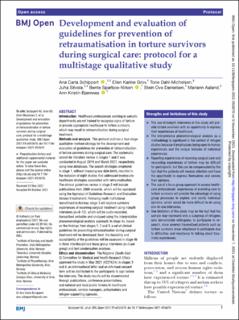Development and evaluation of guidelines for prevention of retraumatisation in torture survivors during surgical care: protocol for a multistage qualitative study
Schippert, Ana Carla Soares Portugal; Grov, Ellen Karine; Dahl-Michelsen, Tone; Silvola, Juha Tapio; Sparboe-Nilsen, Bente; Danielsen, Stein Ove; Aaland, Mariann; Bjørnnes, Ann Kristin
Peer reviewed, Journal article
Published version
Permanent lenke
https://hdl.handle.net/11250/2831944Utgivelsesdato
2021-11-05Metadata
Vis full innførselSamlinger
Originalversjon
http://dx.doi.org/10.1136/bmjopen-2021-053670Sammendrag
Introduction: Healthcare professionals working in somatic departments are not trained to recognise signs of torture or provide appropriate healthcare to torture survivors, which may result in retraumatisation during surgical treatment. Methods and analysis: This protocol outlines a four-stage qualitative-method strategy for the development and evaluation of guidelines for prevention of retraumatisation of torture survivors during surgical care. The systematic search for literature review in stages 1 and 2 was conducted in August 2019 and March 2021, respectively, using nine databases. The search strategies employed in stage 1, without imposing any date limits, resulted in the inclusion of eight studies that addressed inadequate healthcare strategies associated with retraumatisation. The clinical guidelines review in stage 2 will include publications from 2000 onwards, which will be appraised using the Appraisal of Guidelines Research and Evaluation Version II instrument. Following multi-institutional recruitment in Norway, stage 3 will explore survivors’ experiences of receiving surgical treatment using indepth interviews (n=8–12), which will be audio-recorded, transcribed verbatim and analysed using the interpretative phenomenological analysis approach. In stage 4a, based on the findings from stages 1, 2 and 3, a set of clinical guidelines for preventing retraumatisation during surgical treatment will be developed. Next, the feasibility and acceptability of the guidelines will be assessed in stage 4b in three interdisciplinary focus group interviews (n=5 per group) and text condensation analyses. Ethics and dissemination: The Regional (South-East C) Committee for Medical and Health Research Ethics approved the study in May 2021 (#227624). In stages 3 and 4, an informational letter and an informed consent form will be distributed to the participants to sign before the interview. The study results will be disseminated through publications, conference presentations, and national and local public forums to healthcare professionals, service managers, policymakers and refugee-supporting agencies.

